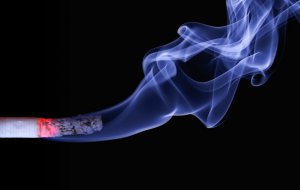Here’s one good reason to participate in the Great American Smokeout on Nov. 21: If you’re a cigarette smoker, urinating is like exhaling smoke from your bladder.
The cancer-causing substances in cigarette smoke (carcinogens) infiltrate not only the lungs and blood stream, but also urine. This means they pass through the urinary tract and the bladder, exposing it to high concentrations of toxins for up to nine hours before the bladder reaches capacity (two cups) and flushes them out.
Yes, the Great American Smokeout is just one day, but that day could make a difference, especially if it starts a lifestyle change.
 Smoking May Cause 40,000 Bladder Cancer Cases in 2019
Smoking May Cause 40,000 Bladder Cancer Cases in 2019
If you’re skeptical of the effects, consider this: Cigarette smokers are at least three times more likely to develop bladder cancer than non-smokers. It is the single most important known risk factor of bladder cancer, according to a report by the Cleveland Clinic, which reports that half of all bladder cancer cases are found in smokers.
That means more than 40,000 of the nearly 80,500 new cases of bladder cancer estimated to be diagnosed in 2019 will be found in smokers. Most cases (61,700) will occur in men, but the rate of the disease among women is just as great and could escalate if smoking rises among younger females. In 2016, the most recent year for data, 13.5% of women and 17.5% of men smoked.
Bladder Cancer Explained
Bladder cancer is the result of cells that mutate and grow uncontrollably, forming a tumor. Because the bladder is comprised of expandable muscular walls, the tumor interferes with the organ’s ability to expand and contract. If not detected, the cancer could spread to other parts of the body.
Blood in the urine is a primary symptom; however, blood may not be visible, so the following symptoms are also important:
- a burning sensation while urinating;
- more frequent urination or trouble urinating; and
- lower back pain on one side.
If you or a loved one experience any of these symptoms, call your urologist to schedule a screening. If the cancer is caught early, the five-year survival rate is 77%.
Tips to Quit Smoking
The American Cancer Society recommends these guidelines for that first day of taking the “butt” out of quitting.
- Make a plan. A smoker has to come to the decision to quit on his or her own and approach it like a plan or set of guidelines. The plan should include a list of reasons for quitting and some activities (such as walks or chewing mints) to take place of habitual smoking breaks.
- Prepare for the mental implications. Nicotine is a drug that affects brain chemistry and therefore it is emotionally addicting. Upon quitting, former smokers could experience depression, anxiety, trouble concentrating and irritability. A variety of free apps and texting programs are available, as are groups such as Nicotine Anonymous.
- Understand nicotine replacement therapy and prescriptions. Nicotine in the form of gum, lozenges, patches and sprays can reduce physical withdrawal symptoms and studies show they can nearly double the chances of quitting. One may also consider prescriptions such as Chantix, but they may need to be started weeks before the quit date.
The American Cancer Society and Smokefee.gov provide many additional tips and suggestions.
Quitting smoking is, like most accomplishments in life, a process. It starts with a day. This Great American Smokeout, let’s avoid smoking for that one day, and then try to make it two. Your bladder will thank you.

 Smoking May Cause 40,000 Bladder Cancer Cases in 2019
Smoking May Cause 40,000 Bladder Cancer Cases in 2019